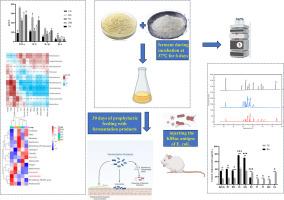Pediococcus acidilactici XM-06 发酵的人参皂苷通过调节肠道屏障功能和肠道微生物群预防小鼠腹泻的作用
IF 3.8
2区 农林科学
Q2 FOOD SCIENCE & TECHNOLOGY
引用次数: 0
摘要
人参皂苷已被广泛用于临床治疗各种炎症性疾病。目前,人参皂苷的抗炎作用主要集中在单体人参皂苷方面,而对人参总皂苷及其与益生菌发酵产物的协同作用研究较少。本研究旨在探讨发酵人参皂苷与 Pediococcus acidilactici 对小鼠肠毒性大肠杆菌腹泻的缓解作用。P. acidilactici XM-06 和人参皂苷发酵产品通过减轻炎症反应、抑制 ERK、上调 Z0-1、0ccludin 和 Claudin-1 水平以及减少氧化应激,对 ETEC 引起的腹泻具有显著的预保护作用。这些产品不仅能修复由 ETEC 引起的小鼠腹泻造成的肠道粘膜损伤,还能通过增加乳酸杆菌和乳酸杆菌的丰度,同时降低肠杆菌的丰度,对肠道微生物群失调产生积极影响,从而有可能为人类预防 ETEC 相关腹泻疾病提供一种新的天然产品。本文章由计算机程序翻译,如有差异,请以英文原文为准。

Effect of ginsenoside fermented by Pediococcus acidilactici XM-06 on preventing diarrhea in mice via regulating intestinal barrier function and gut microbiota
Ginsenosides has been extensively used in clinical settings to treat various inflammatory diseases. At present, the anti-inflammatory effect of ginsenosides is mainly focused on monomeric ginsenosides, while the total saponins of ginseng and their synergistic effect with probiotic fermentation products are rarely studied. This study aimed to investigate the mitigative effects of fermented ginsenosides with Pediococcus acidilactici on Enterotoxigenic Escherichia coli diarrhea in mice. P. acidilactici XM-06 and ginsenoside fermentation products demonstrated significant pre-protection against ETEC-induced diarrhea by mitigating inflammation, inhibited the ERK and upregulated the Z0–1, 0ccludin and Claudin-1 levels, and reducing oxidative stress. These products not only repaired intestinal mucosal damage caused by ETEC-induced diarrhea in mice but also positively influenced gut microbiota dysbiosis by increasing the abundance of Lactobacillus and Bacteroides while decreasing the abundance of Enterobacter, potentially providing a new natural product for the prevention of ETEC-associated diarrheal diseases in humans.
求助全文
通过发布文献求助,成功后即可免费获取论文全文。
去求助
来源期刊

Journal of Functional Foods
FOOD SCIENCE & TECHNOLOGY-
CiteScore
9.60
自引率
1.80%
发文量
428
审稿时长
76 days
期刊介绍:
Journal of Functional Foods continues with the same aims and scope, editorial team, submission system and rigorous peer review. We give authors the possibility to publish their top-quality papers in a well-established leading journal in the food and nutrition fields. The Journal will keep its rigorous criteria to screen high impact research addressing relevant scientific topics and performed by sound methodologies.
The Journal of Functional Foods aims to bring together the results of fundamental and applied research into healthy foods and biologically active food ingredients.
The Journal is centered in the specific area at the boundaries among food technology, nutrition and health welcoming papers having a good interdisciplinary approach. The Journal will cover the fields of plant bioactives; dietary fibre, probiotics; functional lipids; bioactive peptides; vitamins, minerals and botanicals and other dietary supplements. Nutritional and technological aspects related to the development of functional foods and beverages are of core interest to the journal. Experimental works dealing with food digestion, bioavailability of food bioactives and on the mechanisms by which foods and their components are able to modulate physiological parameters connected with disease prevention are of particular interest as well as those dealing with personalized nutrition and nutritional needs in pathological subjects.
 求助内容:
求助内容: 应助结果提醒方式:
应助结果提醒方式:


